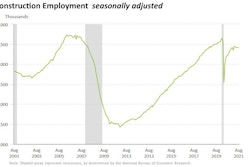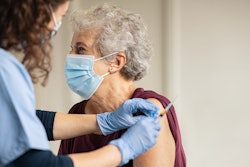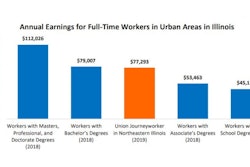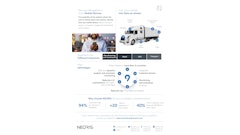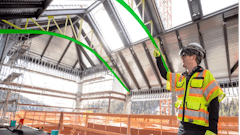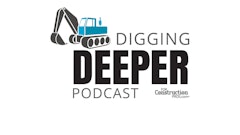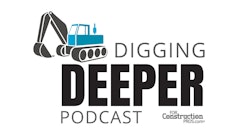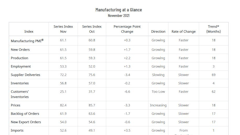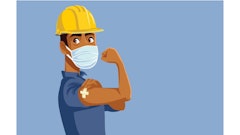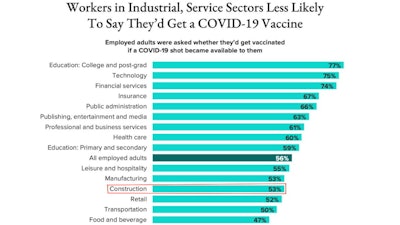
Essential construction workers are less likely than the average U.S. employee to take the COVID-19 vaccine when it’s available to them. A series of surveys on employee acceptance to the vaccine found a national average of 56% said they want the vaccine, with a range of 75% for workers in the technology industry down to 47% for workers in the highly exposed food and beverage industry.
Fifty-three percent of workers in the construction industry said they would take the COVID-19 vaccine.
The retail, transportation, manufacturing, construction and leisure and hospitality sectors all saw below-average levels of willingness to be vaccinated. Findings are drawn from 17 surveys conducted by Morning Consult from October 29, 2020, to January 29, 2021, among 16,970 employed U.S. adults and have a margin of error of 1 percentage point.
Retail workers and those in the food and beverage and leisure and hospitality industries were also more likely than those in other fields to say COVID-19 poses a severe health risk, and to say COVID-19 will affect their jobs. Two-thirds of retail and food and beverage workers said the virus is a severe risk in the country, for example, compared to 55% of those working in technology and 48% of those in insurance.
Essential workers unable to work from home, such as construction laborers, have risked their lives to earn a living over the past year, with food and agriculture workers, those in transportation or logistics and construction laborers all seeing higher rates of excess mortality during the pandemic, according to one California study.
Workplaces may end up playing an important role in getting people vaccinated. In December, the federal agency focused on workplace discrimination, the Equal Employment Opportunity Commission, said employers could make COVID-19 shots mandatory for their workers.
“The vaccination itself is not a medical examination,” the EEOC guidance states. The EEOC defines a medical examination as a procedure or test usually given by a health care professional or in a medical setting that seeks information about an individual’s physical or mental impairments or health. Examples include vision tests; blood, urine, and breath analyses; blood pressure screening and cholesterol testing; and diagnostic procedures. “If a vaccine is administered to an employee by an employer for protection against contracting COVID-19, the employer is not seeking information about an individual’s impairments or current health status and, therefore, it is not a medical examination.”





